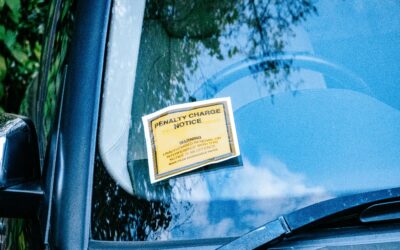As a PCO driver in London, the last thing you want is getting a PCN (Penalty Charge Notice). Whether that is forgetting to pay the Dartford Crossing charge or overstaying your allotted time at charging stations, It’s never a nice feeling.
Here at Rapid PCO, we care about our drivers, and we are always on the lookout for certain PCN hotspots and changes in the rules to ensure that we can help you avoid these fines and maximise your earnings.
Sometimes, even if you are extra careful on your journeys, there can still be a PCN lurking around the corner (literally). In this article we will discuss the most common PCNs that PCO drivers receive in London and what you should look out for in order to avoid fines.
To stay up to date with PCN hotspots and to learn how to avoid these traps that we identify and share here at Rapid, check us out on Facebook and Instagram.
What to look out for to avoid PCN fines in London
Dartford Crossing charge
If you use the Dartford crossing between 6am and 10pm, you must pay the fee by midnight on the day after you have crossed. If you are paying a one-off fee, you will need to pay £2.50, but if you have an account the amount is reduced to £2.00. The fee is charged per crossing, so if you go over the bridge and then return through the tunnel in the same day, this is considered as two crossings which are both chargeable.
If you fail to pay the Dartford Crossing charge by midnight the day after using it, you will be liable for a £70 PCN (Penalty Charge Notice).
If you need to make the payment, or you would like to save the site for later, please click here for the Dartford Crossing charge payment page.
We recommend setting up an autopay account. Each crossing you make will be automatically paid from this account. You can open a Dart Charge Pre-Pay account with an initial deposit of £10, although you are able to add more if you so choose. Your account will top up by itself when it drops below £5 (or your chosen amount).
To apply for a Dart Charge Pre-Pay account, you can fill in this form.
You must remember to update your account with the correct vehicle details and remove any vehicles that you no longer use to avoid someone else using your credit for their journeys.
Airport drop-off charges
Airport drop-off charges can be a very common fine for our private hire drivers at Rapid PCO, and the PCN fine can reach up to £80. The small mistake of forgetting to pay the airport drop-off charges can strip you of all of the hard-earned money you have made from the trip, so it is crucial that you remember to pay before the deadline.
The best way to ensure you don’t forget to pay the airport drop off charge is to set up an autopay account. We advise that you search up the airport you will be attending to get your account set up.
You can find a list of all the different charges here.
Paying the airport drop-off charge:
Paying for your drop-off charges is your responsibility. Depending on what airport you visit, you will be able to find all the information on how to pay the charge on each individual site.
When searching to find out how to pay a specific airport drop-off charge, we would recommend you type in your search so that it looks something like this:
(Pay *Insert airport name* drop-off charge).
Overstaying
Here at Rapid PCO, a lot of our drivers have recently been receiving fines for over-staying at EV charging ports. We understand this can be easily overlooked, as some EV drivers might not think to leave until their vehicle is fully charged.
The overstaying fees have been implemented to allow as many EV drivers as possible to charge their vehicles. Each port will be different. For example, if you overstay the rapid charger session limit of 60 minutes at ESB, you will be charged a fee of £8, and at BP Pulse, an overstay fee of £10 applies if you have been charging for over 90 minutes on their 50kW, 10kW and 300kW chargers.
You can find a charging point near you here, just remember to look for the signs.
It is also important to look out for signs in supermarkets and petrol stations, for example, as many of these places have a limit on the amount of time you are allowed to stop off there. As many will offer free parking, you need to keep in mind when your allotted time will run out.
Box junctions
These junctions are the ones with criss-cross yellow lines painted on the road. By law, you must not enter the box until your exit road or lane is clear. If you are turning right, however, you may wait in the box until your path is not blocked by oncoming traffic or other vehicles are also turning right.
Bus lanes
Many private hire drivers think that because they are a PCO driver they can use bus lanes. Every bus lane will have signs to let you know either the times you are allowed to use the bus lane or if you are allowed to use it at all.
PCO drivers are, however, allowed to enter the bus lane to complete a passenger pick up or drop off, but you must exit as soon as you are finished.
Regular and Average Speed Cameras
When driving to and from jobs, it is imperative that you keep an eye on your speed, for both you and your passengers’ safety. Don’t just slow down when you see a speed camera; be wary of your speed and you will drastically reduce your chances of receiving a speeding ticket.
Average speed cameras do not capture your speed in a single flash: they monitor your speed from two different points. If you have been driving over the speed limit in between both points you will likely receive a speeding ticket and may face prosecution.
Please check signage on your routes for any change in speed limit:
- Built-up areas: 30mph
- Single Carriageways: 60mph
- Dual Carriageways: 70mph
- Motorways: 70mph
Red Routes
You will be able to spot the different red routes and find out what you can and can’t do by keeping your eye out for any signs and road markings when you are driving.
Red routes in London were implemented to ease traffic congestion, and as of today they make up 5% of London’s roads. If you would like to get a better understanding of Red routes and the different types, you can find out more on the TFL website.
No Entry Signs
Before entering any new road, keep an eye out for any signs that are there. Avoiding a PCN charge for going in a restricted area can be easily avoided.
If you want to refresh your memory with the different signs to look out for, you can find them on the RAC website.
Failing to drive in the direction shown by the arrow on a blue sign
If you go against the direction shown on the arrows (white arrow with a blue background) you can receive a PCN fine of up to £130.
Restricted zones
Entering pedestrian zones or any areas that are restricted, even if you are dropping off or picking up passengers, is liable for a PCN fine of up to £130. Always keep an eye out for where you are allowed to enter, and you can easily escape an avoidable fine.
Using The Wrong Width Restriction Lane
Many PCO drivers use the middle entry section, which is reserved only for certain vehicles (mainly buses). You need to keep to the left-hand side with the width restriction lane if you want to avoid getting a fine.
Congestion charge
Unless your car is an EV you will have to pay £15 for the day every time you drive within the Congestion Charge Zone between 7:00-18:00 Monday-Friday, and 12:00-18:00 Saturday-Sunday and bank holidays. There is no charge between Christmas Day and New Year’s Day.
The easiest way to avoid being given a fine is to set up Auto Pay. Setting up Auto Pay means that, even when you forget, you will be charged automatically and therefore miss out on a £160 fine.
Want to appeal a PCN?
The AA have a great article all about Penalty Charge Notices, covering what a PCN is, what types of appeals there are and how you can appeal. For more information, you can find this article about Penalty Charge Notices here.
Rent with Rapid today
We’ve let you know what to look for when it comes to PCO driving, so you can trust us when it comes to what to look for in a PCO vehicle.
Join thousands of private hire drivers who entrust us with their PCO car rental needs.
Call us on 01732 747 190 or click here to find out about our huge range of PCO private hire vehicles, ready for collection today!



